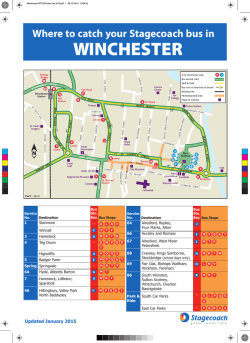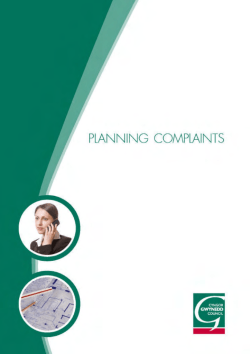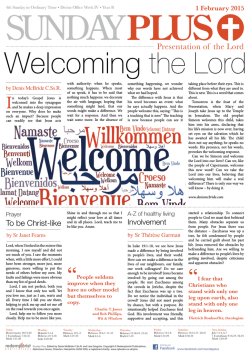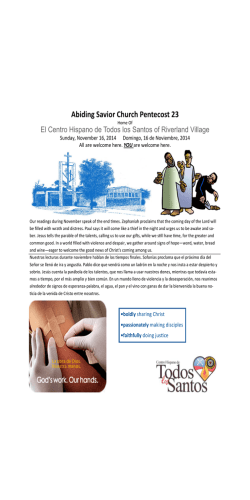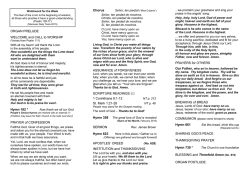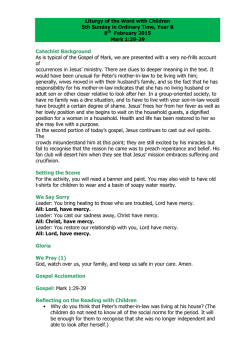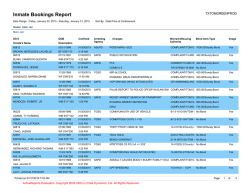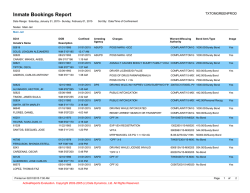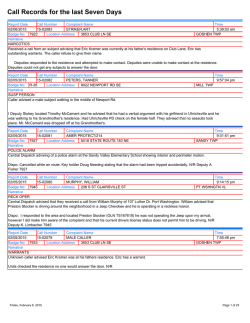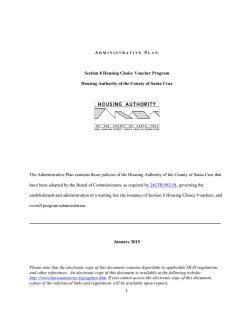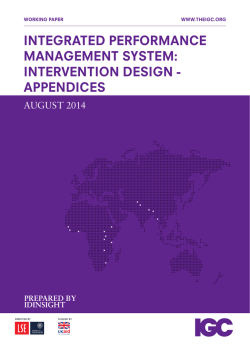
A New Year
A New Year Richard Dawson 1 February 2015 Matt 631-33/ Psalm 92/ Is 4027-31 So do not worry…! About what you will eat or wear… for God knows your need and is pleased to provide! But your concern should be to put first God’s kingdom and God’s righteousness… How are we going to do that this year friends? How are we going to put God’s concerns first in our life? How are we going to prefer God’s righteousness to ours? How are we going to stop worrying about the little things – clothes, food, drink and concern ourselves with the big picture? You say, ‘But Richard, clothes, food and drink are not little things, they are big things. We can’t live without them. Isn’t it right to be concerned about the basics of life? Yes it is, of course it is… unless, your employer has already worked them into your contract and said to us all effectively, ‘I will take care of all that stuff if you will concern yourself with my business. Clothes, food drink, all yours – just concern yourself with my concerns, my priorities.’ The whole of the Christian life is a battle for priorities. Before I really knew God there were several sets of competing priorities in my life – mine, my parents, and everyone else’s. I hated having to adopt anyone else’s but mine and I still struggle not to put these first. When I met Jesus I discovered he also had priorities for my life and though I struggled with these I eventually realised that these priorities, once adopted, brought 1 me a peace and a security and a wholeness I could achieve nowhere else. No one else understands my life like God does. My priorities left me burdened and troubled. God’s priorities leave me at peace. His yoke is easy and His burden is light! God’s will for us is a good one. God is a good God. God has a way which is narrow but it leads where we all ultimately want to go. But Richard – how do we do this? How do we make God’s priorities our priority? How do we know what are God’s burdens and what aren’t? Good question… you are so sharp this morning – this is fun being together! How do we discover this good will of Gods’? How do we discover God’s priorities for our life and how do we make them ours? Let me give you a way forward based on that passage from Isaiah 40 we read together this morning because it begins as a complaint against God – a common complaint which is that God ignores us and doesn’t understand what we’re going through. Israel is making this complaint against God and Isaiah then answers the complaint on behalf of God. Notice first of all that the complaint is not answered directly. The writer doesn’t come out with a direct contradiction of the complaint such as ‘Nonsense, of course God sees us and cares for us!’ Instead what he does is to begin to describe who God is again. And who is God? God is the Lord of time – He is the everlasting God and what this tells us is that God is God by being in control of time. More and more today we find that time is our enemy. We either never have enough of it or we’re impatient because it’s moving too slow. We resent time spent in some ways and we long for time to be spent in certain other 2 ways. We waste time and we use time as an excuse. But with God there is always time because God is over time. One of the first ways we can make God’s priorities ours is by allowing God to be Lord of our time… So much of our anxiety in life revolves around time when in God we will have all the time we need. And far from God not having time for us (which is, of course, the thinking behind the complaint), the real issue is what we do with our time. Here’s a little story from John Ortberg to illustrate what I mean. "Redeem the time," Paul says, "for the days are evil." Or maybe it's me. I have been thinking a lot about two of Jesus' agricultural metaphors regarding ministry over the past few years. First, "Put your hand to the plough and don't look back." I have been doing that in my ministry. I have had an extremely strong conviction that I am to follow my calling in the place where I am and not waste energy thinking about other possibilities. I'm convinced I will grow in ways I would not otherwise if I put my hand to the plough and don't look back. Second, "My yoke is easy and my burden is light." This one has been harder. I have faced difficult staff transitions and change navigation and new multi-site planting and fund-raising and often felt in over my head. I have often felt myself preoccupied and weighted down, and yet I feel as deeply called to what I'm doing as I ever have. How do I put my hand to the plough but live with the easy yoke? 3 Several weeks ago my wife pulled me into the bedroom, closed the door, and said there were a few things she wanted to talk about. She said she was kind of afraid to bring them up. She had a list. I was not happy that she had a list. She began: "When our marriage is at its best, we are sharing it together. We share division of labour stuff. We partner together around the house—our kids see this. We each know and care about details in each other's life and work. To be honest: it feels like that's been slipping. It feels like you have been becoming so preoccupied by all the things you have to do, by all the demands you think are on your shoulders, I'm kind of missing the you I most want." … She said: "When you are fully present…light, breezy, spontaneous, fun, ready to listen, alive to joy—I love that man. I need that man. I haven't seen that man around much lately." It took me a couple days to process this talk, because pouting is more or less my spiritual gift, and I had to get that out of my system first. But I thought about the kind of life she was describing. I know that life. It's like I've been waiting for circumstances to change so I can live that kind of life. I'm not waiting any more. I started praying. God, I need some help. Ideas started to come. I need some wisdom, some accountability—and I watched God start to bring some of that into my life. I knew I needed either a therapist, a spiritual director, or an executive coach. And I finally landed on the best choice and started moving forward. … And then, this thought: I can do this. I can set aside the weight 4 of unfinished tasks and unsolved problems when I come home. I can be fully present and alive even though everything around me is not settled down. Each moment I can choose this; I can ask God's help with it. And it's been like a mini-revival. I find myself thinking, when problems arise, Bring it on. Each problem is, among other things, an opportunity to exercise this muscle, to make it stronger. And if I forget in one moment, I can begin again with God the next. I've been struck by how this can be done by anyone, anywhere. … I want to live with my hand on the plough. I want to live under the easy yoke. I want to redeem the time. So point 1. God has time for me – time given specifically to me, for me and with me. Question: Have I got time for God? In short our use of time needs to involve God. We make choices about time all the time but how many of those choices are faith choices – choices we are making because we believe they are what God would have us do? If we truly want to redeem time we need to learn to give time back to God and allow God to be Lord of our time. Second point. God always pays the long game. The prophet uses the phrase, God is the Creator of everything… In Hebrew this phrase literally means ‘Creator of the borderlands or the far away places’ so what it’s saying is that God’s Creative power extends beyond the very localised concerns of those who are complaining to the edges. And the force of this is to indicate that God’s concern extends to not just those places on the edge but the people who live in those places. So the writer here is suggesting that if it seems as if God has been uncaring what one 5 must realise is that God is needing to be patient, God playing the long game. We encounter a bad experience, a period of disappointment, a loss and it seems as if our whole world is black. But from another perspective this is simply the night time and the day is coming. In our Psalm God plays the long game and it is this long game that sees evil defeated… 6 The senseless man does not know, fools do not understand, 7 that though the wicked spring up like grass and all evildoers flourish, they will be forever destroyed. 8 But you, O LORD, are exalted forever. 9 For surely your enemies, O LORD, surely your enemies will perish; all evildoers will be scattered. 10 You have exalted my horn like that of a wild ox; fine oils have been poured upon me. 11 My eyes have seen the defeat of my adversaries; my ears have heard the rout of my wicked foes. The All Blacks are successful these days because they play a long game. That is, they don’t get too worried if they get behind because they always play the full 80 minutes and they know that if a side relaxes against them they’re dead meat. God plays the long game and so to adopt the priorities of God means that we need to be prepared to walk through some dark nights knowing that the sun will shine again. He does not faint or grow weary; his understanding is unsearchable. 6 Point 3. God is first and foremost trustworthy and our job is to trust Him. If God’s understanding is unsearchable, as the prophet says, it means that our job is not firstly to understand Him but to believe Him. Our first move towards God should always be a move of belief – not of understanding. When I try to understand something or someone I am holding them at arm’s length – I am looking for proof – I am placing them under my judgement so that I might decide for or against them. Our relationship with God can never proceed on this basis. The ay to understanding of god is always, always, always through belief. When we believe something our primary movement is one of trust – we believe so we trust. We trust because we believe. Why should we come to God like this? Why should this be our first move? Because ultimately, no matter how well we understand God, no matter how qualified we are in the ways of God – relationship with God begins with trust – not understanding. You see understanding implies a conditional relationship – ‘God I will not… until I understand.’ With trust there is no condition. I am available to God when I trust. I am not necessarily available to God when I seek to understand God. Now please remember – I am not saying that trying to understand God is a bad thing. I am only saying that it shouldn’t be the first thing. The first thing is to know that God is trustworthy, from that flows relationship and from relationship will flow understanding. Finally, 29 He gives power to the faint, 7 and strengthens the powerless. 30 Even youths will faint and be weary, and the young will fall exhausted; 31 but those who wait for the LORD shall renew their strength, Point 4: Waiting sums up almost everything about our relationship with God. God is the waiting God and when Isaiah calls for us to wait on God it isn’t so much because God needs to catch up with us but because Waiting is how we make God Lord – waiting is the stuff of our relationship with God – it’s what it’s made up of. So when I’m waiting for the bus it’s not that I’ve been going faster than the bus but simply that by waiting I will actually meet the bus. If we want to meet God we will need to be prepared to wait. Why wait? 1. Because when we wait is the first act of trust. When I wait for the bus I trust that it will come. Those who don’t believe the bus will come don’t wait for it. 2. Because in the stillness of waiting we can begin to hear God. Restless people can’t hear God – indeed can hear very little. Notice how Jesus describes the pagans in our passage from Matthew… they are those who are ‘running’ after things. They’re always in motion, they full of action, they’re busy and… they’re missing God. This year… stop for God! 8
© Copyright 2026
